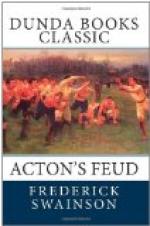“Now come, Acton. You’ve fought well, and, by Jove! you ought to lose well. Bourne fought like a gentleman, and you’ve been beaten fairly. What is the good of bearing any malice?”
“Look here, Acton,” said Phil, “I’m jolly glad I’ve thrashed you, but all is over now. Here’s my hand, and we’ll let bygones be bygones.”
“Never!” said Acton. “I’ll get even with you yet.”
“So be it,” said Bourne; and he turned away, and got into his coat, leaving Vercoe and Acton on the field of battle. “Don’t care to mention it, old man,” he said to me as we got to his room, “all the same, I thought I was a gone coon just when I knocked the fellow out.”
I went for my holidays that morning, and Acton, escorted by Vercoe, got into the same train. He was white and almost scared looking at his defeat, but there was on his face still that unfading expression of unsatisfied hate and lust for revenge. I buried my face in my paper in utter disgust.
So you see Acton departed from St. Amory’s at the beginning of the Easter holidays in a slightly different mood from that which he enjoyed at Christmas, when the young Biffenites had cheered him till they were hoarse and he was out of hearing.
Toby was almost beside himself with consternation when Bourne and Vercoe turned up at the Courts in the afternoon.
“Your ’ands, Mr. Bourne, and your eye! What have you been a-doing of?”
“I have had the painful necessity to thrash a cad, Toby.”
“But you did thrash him, sir?”
“I fancy so,” said Bourne, grimly.
Jack went home in the evening a sadder and wiser boy. When he saw his brother’s closed eye and swollen lip, and the angry patches on his cheeks, he was cut to the heart; he took his thrashing like a man, and, when all was over, felt he loved and respected his brother more than ever. “What a beastly little pig I’ve been,” he said to himself.
Vercoe and Bourne were the victorious finalists at Kensington in the rackets. It was, as the papers aptly remarked, “Quite a coincidence that Bourne’s right eye was beautifully and variously decorated in honour of the occasion.”
I don’t expect many finalists, at rackets anyhow, turn up with black eyes.
CHAPTER XXVI
THE MADNESS OF W.E. GRIM
Grim and Wilson had come back to St. Amory’s firmly convinced that Biffen’s was the most glorious house that had ever existed, and that it would do—thanks to Acton, Worcester, and the dervishes—great things when the cricket housers came round.
“Grimmy,” said Wilson, “you’ll have to try to get into the team this year. You would last, if your batting hadn’t been so rotten.”
“All right, old man; don’t rub that in too often.”
“You put in a lot of extra practice at one of those bottom nets, Grimmy, and you’ll find Worcester’ll shove you in first choice, almost, this go.”




